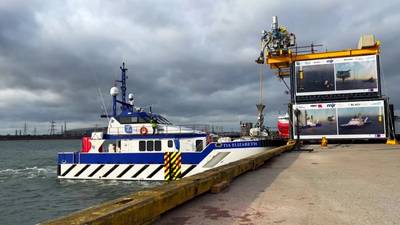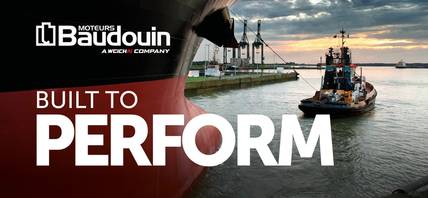Offshore Vessel Charging System Passes Harbor Tests
UK-based marine electrical engineering company MJR Power and Automation on Tuesday announced the successful harbor trials of its platform-mounted automated offshore power and charging system.
The offshore power and charging system is designed to convert energy delivered directly from the offshore wind farm, and enable all heavy hybrid and electric crew transfer vessels and other offshore support vessels to connect and get powered by electricity generated directly by offshore wind turbines.
The company said the system will also enable offshore power to be supplied to other support vessels allowing them to turn off their diesel generators whilst standing by, in the same way, that they can connect to shore power.
MJR Power and Automation claims the system will revolutionize the marine sector by enabling the transition to heavy hybrid and fully electric vessels for zero-emission operations.
The harbor trials were conducted in the Port of Blyth using the TIA Elizabeth Crew Transfer Vessel (CTV) owned and operated by Tidal Transit.
According to MJR Power and Automation, the set-up at the port replicated the installation of the offshore power and charging system on an offshore wind turbine and/or substation, validating the safe connection, mooring, and charging of battery bank installed on the CTV.
"With safety embedded throughout the system, all interconnection, mooring, automation, monitoring, and safety systems, including wireless communication and emergency disconnection, were vigorously tested and validated during the trails," MJR Power and Automation said.
Cutting CO2 Emissions
Speaking about the successful trial, Paul Cairns, Managing Director at MJR said:"By providing a solution to power vessels and charge batteries in the field – primarily during periods when they would otherwise be idle – MJR’s offshore power and charging system will prove to be a key enabler for the large-scale deployment of eCTVs and larger electric hybrid vessels across the offshore sector."
“Put simply, if 50% of the UK’s CTV fleet converted to electric operation, this would eliminate approximately 131,100 tonnes of CO2 each year.
These figures are staggering and highlight that such technology, and the adoption of it, will be pivotal in reducing emissions in the field and helping owners, operators and governments to achieve their net zero targets."
With successful harbor trials now complete, MJR will now demobilize the equipment and prepare for installation on an operational offshore wind farm substation in the North Sea. The company did not say when exactly the system would be installed offshore.
In addition to charging CTVs, with a maximum charging time of two hours, MJR said it was also developing a similar system delivering higher powers for providing offshore power and charging for larger vessels, including Service Operations Vessels (SOVs).












